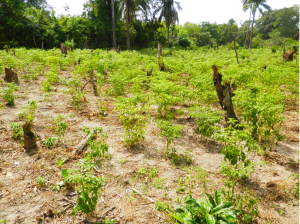
MONROVIA – Adah Johnson,* 56, from Flumpa, Nimba County in north-eastern Liberia is a beneficiary of the continued awareness sessions on the rights of women to land and participation in land governance decision-making processes conducted by a local non-governmental organization, Rights and Rice Foundation (RRF), with support from UN Women Liberia.
When Ms. Johnson lost her husband in September 2022, her relatives evicted her from her house and gave her the option to marry her late husband’s brother so that she could continue staying at the house. She was not interested in this arrangement. In contrary to this proposed arrangement and in accordance to the Land Rights Act of 2018, on the demise of a partner or spouse the living spouse and their children have the right to all the property left behind by the deceased.
Although Ms. Johnson had not attended any of the awareness sessions, her friends from the community who had been active participants invited her to one of the sessions so that she could share her experience.
Some community leaders who had benefitted from the trainings on women’s land rights and participation in land governance, pleaded with the family and explained to them that under the Land Rights Act, Ms. Johnson has a right to her late husband’s property and should not be forced to marry against her will.
According to the Women’s Land Rights Act, all community members including women have a right to own land. In addition, widows have the right to inherit the land of their deceased spouses as articulated in the inheritance law.
After some negotiations, Ms. Johnson got her farmland back, but she is yet to recover her house. Authorities have intervened and are in discussions with the family so that they give Ms. Johnson her house back. She is currently living in Kakata, Margibi County with her four children. She sells charcoal and firewood to earn a living.
“Papay Edwin Zengbay, General Town Chief of Flumpa and others intervened and told them they were wrong. They then gave me the land back but not the house. My husband’s people are living in the house now. I felt bad but I don’t have money to go to the law and I am powerless, so I left the house to them,” said Ms. Johnson.
According to Ms. Johnson, “It is necessary to keep encouraging women to speak out when oppressed and denied of their rights. Women should also seek advice because they do not have money to go to the law as was in my case.”
The Rights and Rice Foundation (RRF) has been conducting awareness sessions and trainings on land rights and participation in land governance. “It is an opportunity for community members to get more information and resolve conflicts they may have over lands. We don’t go to court on behalf of beneficiaries. We leave it to community elders and the people to resolve conflicts, says Joseph Ballah, Gender Specialist at RRF.
Empowering women also means empowering men to be champions for women rights as seen in this case where male elders also fought for Ms. Johnson’s rights.
Ms. Johnson is one of many women in rural Liberia who were forced to leave their homes when theirs husbands died but have been empowered to know more about women’s land rights. UN Women is supporting Rights and Rice Foundation to conduct awareness raising sessions on women’s land rights under the project, “Sustaining Peace and Reconciliation through Strengthening Land Governance and Dispute Resolution mechanisms,” funded by the United Nations Peace Building Fund.
